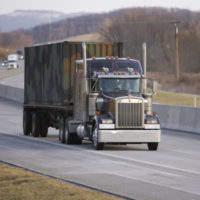Dangers of Overloaded Trucks on the Roads
August 15, 2019 A typical tractor-trailer can weigh up to 80,000 pounds or 40 tons with cargo on board. That is around 30 times the weight of the average passenger vehicle. Because extra weight can interfere with the safe operation of a commercial truck, the Federal Motor Carrier Safety Administration (FMCSA) puts strict weight limits on different types of trucks. Overloaded trucks are more difficult to control, increasing the risk of an accident and putting lives in danger. Overloaded cargo poses a number of safety concerns, such as:
A typical tractor-trailer can weigh up to 80,000 pounds or 40 tons with cargo on board. That is around 30 times the weight of the average passenger vehicle. Because extra weight can interfere with the safe operation of a commercial truck, the Federal Motor Carrier Safety Administration (FMCSA) puts strict weight limits on different types of trucks. Overloaded trucks are more difficult to control, increasing the risk of an accident and putting lives in danger. Overloaded cargo poses a number of safety concerns, such as:
Mechanical Failures
Trucks are designed and required by law to carry a limited amount of cargo. When they are overloaded, mechanical failures are more likely to occur. Brakes and tires can fail under the extra weight, causing the truck to lose control and collide with pedestrians or other vehicles on the road. The weight and force of large, commercial trucks makes them more dangerous than smaller vehicles when involved in a crash. Most fatalities in truck-car crashes are passengers in smaller vehicles.
Gravity
Truck drivers traverse every sort of environment imaginable, from hectic city streets to winding roads. Cargo that exceeds FMCSA weight limits can be especially dangerous on steep inclines. As the truck moves downward, the weight of gravity can pull the truck forward into the vehicle ahead of them, causing a catastrophic rear-end truck accident.
Jackknifing
Overloaded trailers are a common cause of jackknifing, causing the driver to lose control, collide with nearby vehicles, and possibly tip over. Jackknifing accidents happen in a matter of seconds, causing a dangerous barricade that other vehicles may not have enough time to avoid, especially in bad weather.
Liability and Overloaded Truck Accidents
Laws exist not just to regulate truck weights, but also to ensure trucking owners and operators maintain their vehicles, drive safely, and follow traffic laws. Preventing truck accidents is critical because the risk of catastrophic and fatal injuries increases with larger, heavier vehicles. In a crash, the human body absorbs some of the impact. When that force is produced by a multi-ton machine, damage to human life and property can be devastating. Establishing liability for an overloaded truck accident is not always simple. Many individuals and companies play a role in loading and transporting cargo. When trying to determine liability, you might ask:
- What company or individual oversaw the loading process?
- Was anyone present and aware of overloading but neglected to report it?
- Did the driver comply with mandatory cargo inspections throughout their trip?
- Is the trucking company legally responsible for their employee’s negligence?
An experienced Baltimore truck accident lawyer asks these questions when evaluating an overloaded truck accident case to determine liability and decide if a lawsuit makes sense for individuals hurt in a crash.
Baltimore Truck Accident Lawyers at LeViness, Tolzman & Hamilton Represent Victims Injured by Unsecured or Overloaded Trucks
If you have suffered serious, life-changing injuries in a truck accident, a Baltimore truck accident lawyer at LeViness, Tolzman, & Hamilton can help. We do the work necessary to determine what went wrong and who is responsible. Call us at 800-547-4LAW (4529) or contact us online for a free consultation today.
Our offices are located in Baltimore, Columbia, Glen Burnie, and Towson, allowing us to represent truck accident victims in Maryland, including those in Anne Arundel County, Baltimore County, Carroll County, Harford County, Howard County, Montgomery County, Maryland’s Western Counties, Prince George’s County, Queen Anne’s County, Southern Maryland, and the Eastern Shore, as well as the communities of Catonsville, Essex, Halethorpe, Middle River, Rosedale, Gwynn Oak, Brooklandville, Dundalk, Pikesville, Nottingham, Windsor Mill, Lutherville, Timonium, Sparrows Point, Ridgewood, and Elkridge.






